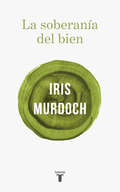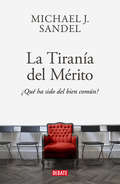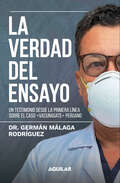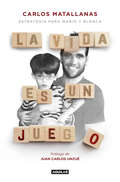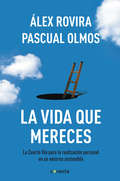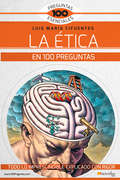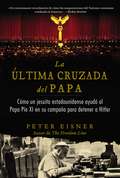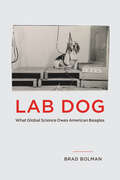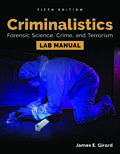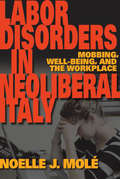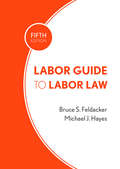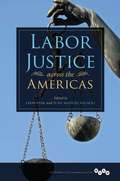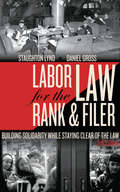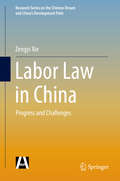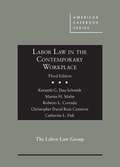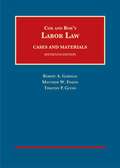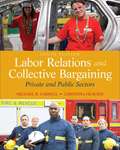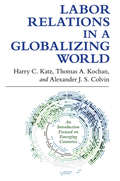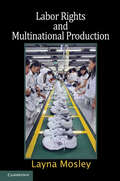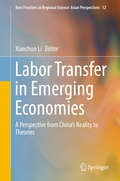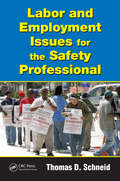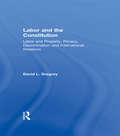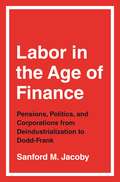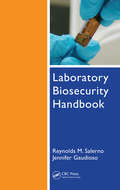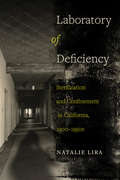- Table View
- List View
La soberanía del bien
by Iris MurdochLa gran aportación filosófica de Iris Murdoch en el centenario de su nacimiento. Antes de convertirse en la gran novelista que fue, Iris Murdoch se dedicó intensamente a la filosofía, enfrentándose con valentía a los círculos analíticos y existencialistas de la época y buscando un camino de salida en el páramo de la posguerra europea. Especialista en Platón, relacionada con la escuela de Wittgenstein, pero siempre radicalmente independiente, Murdoch reunió en La soberanía del bien (1970) tres conferencias que resumen lo que había sido su investigación filosófica desde la década de 1950. A diferencia de la mayoría de sus colegas en Oxford y Cambridge, Murdoch estaba interesada sobre todo en la vida moral y en las posibilidades reales que el ser humano tiene de hacerse mejor persona. La idea del Bien en un mundo sin Dios fue siempre su principal preocupación y a ella le dedica estos tres ensayos combativos y edificantes. En esta edición, Andreu Jaume nos ofrece una nueva traducción anotada de este clásico del pensamiento así como un largo ensayo introductorio en el que se estudia la vida, la filosofía y las novelas de quien fue definida en su tiempo como «la mujer más brillante de Inglaterra». La crítica ha dicho:«Uno de los escasos libros modernos de filosofía que personas ajenas a la filosofía académica pueden encontrar realmente útil.»Mary Midgely «Excelente. Golpea en la raíz misma de nuestra autocomprensión contemporánea. Niega cosas que tendemos a entender como evidentes. Por esa sola razón ya vale la pena leer este breve libro.»The Guardian
La tiranía del mérito: ¿Qué ha sido del bien común?
by Michael J. SandelEl profesor de filosofía más famoso del mundo, analiza el fracaso del sistema meritocrático y aborda la pregunta más importante de nuestra época: ¿qué ha sido del bien común? Las sociedades occidentales padecen dos males relacionados, la desigualdad económica y la polarización política. En el marasmo resultante, parece que hemos perdido de vista la noción clave del bien común. En esta obra fundamental, Michael J. Sandel se plantea cómo recuperarla. Cuando solo hay ganadores y perdedores y la movilidad social se ha atascado, resulta inevitable la combinación de ira y frustración que alimenta la polarización y la protesta populista, además de reducir la confianza en las instituciones y en nuestros conciudadanos. Así no podemos hacer frente moralmente a los retos actuales. Sandel, premio princesa de Asturias de Ciencias Sociales y uno de los filósofos más prestigiosos de nuestra época, sostiene que para superar las crisis que asedian nuestras sociedades hemos de repensar las ideas de éxito y fracaso que han acompañado la globalización y el aumento de la desigualdad. La meritocracia genera una complacencia nociva entre los ganadores e impone una sentencia muy dura sobre los perdedores. Sandel defiende otra manera de pensar el éxito, más atenta al papel de la suerte, más acorde con una ética de la humildad y la solidaridad y más reivindicativa de la dignidad del trabajo. Con esos mimbres morales, La tiranía del mérito presenta una visión esperanzadora de una nueva política centrada por fin en el bien común.
La verdad del ensayo
by Germán Málaga RodríguezEl doctor Germán Málaga Rodríguez cuenta, con lujo de detalles, su versión de los acontecimientos. Desde su trabajo en la primera línea de atención de los enfermos por el COVID-19 hasta el estallido del escándalo mediático El médico e investigador Germán Málaga Rodríguez tuvo la misión de liderar el ensayo clínico para probar la eficacia de las candidatas a vacunas del laboratorio chino Sinopharm, el estudio más importante y ambicioso en este campo que se haya realizado en la historia del país. No obstante, las denuncias periodísticas que desembocaron en el caso «Vacunagate» peruano lo convirtieron en el blanco de la virulencia mediática y de graves acusaciones que nunca pudieron ser demostradas. En este libro, el doctor Málaga cuenta, con lujo de detalles, su versión de los acontecimientos. Desde su trabajo previo en la primera línea de atención de los enfermos de la COVID-19 y el inicio del ensayo clínico, hasta el estallido del escándalo mediático y los entretelones de las controversiales inoculaciones del expresidente Martín Vizcarra, entre otras autoridades y funcionarios. El testimonio del Doctor Málaga busca ahondar en cómo ocurrieron los hechos de un polémico caso que sacudió a la opinión pública. Se trata de un material fundamental para entender y determinar si realmente se cometió un acto de injusticia contra el autor de estas páginas, y para reflexionar sobre la posverdad y las narrativas que agobian nuestro tiempo.
La vida es un juego: Estrategia para Mario y Blanca
by Carlos MatallanasCarlos Matallanas, exdeportista y querido periodista deportivo afectado por la ELA, nos trae un breve y emocionante ensayo, estructurado a modo de manual de fútbol, sobre la importancia de tener una pasión. LAS REGLAS DE LA VIDA SON COMO LAS REGLAS DEL JUEGO: SE APRENDEN CON LA PRÁCTICA Y FORJAN EL CARÁCTER «Voy a hablaros de lo único que sé de verdad, la única disciplina que me llevó al eureka, donde encontré alguna respuesta crucial, que me hizo ser consciente de que algo, mucho o poco, había comprendido de este tinglado absurdo que llamamos vida». Carlos Matallanas, exdeportista y querido periodista deportivo, nos trae un breve y emocionante ensayo, estructurado a modo de manual de fútbol, sobre la importancia de tener una pasión. Nos habla de la vida como juego y del fútbol como metáfora de la existencia. Desde sus páginas, el autor transmite su amor por el deporte, pero utilizándolo como excusa para filosofar sobre temas como la perseverancia, la empatía, el respeto, la solidaridad o la resiliencia. El fútbol ha dado sentido a su vida, incluso para enfrentarse a su enfermedad, la ELA, que lo tiene inmovilizado en una cama desde la que escribe estas líneas a modo de ensayo para sus sobrinos y para todo aquel que lo quiera leer, «porque siempre habrá un niño mirándote y al que le debes dar el mejor de los testigos: tu ejemplo».
La vida que mereces: La cuarta vía para la realización personal en un entorno sostenible
by Álex Rovira Pascual OlmosUna alternativa al sistema actual basada en la búsqueda de un sendero que armonice lo material con lo espiritual, la productividad con la satisfacción personal. Vivimos en un entorno profundamente disfuncional que está dando lugar a mayores índices de corrupción, desempleo, desesperanza y la creciente falta de confianza en nuestros semejantes. Nos encontramos, por lo tanto, ante un reto crucial: recomponer, redefinir o reinventar un sistema social y político capaz de brindarnos a todos una vida digna, una convivencia fructífera y sostenible, en la que no tenga cabida el abuso, la especulación, el cortoplacismo ni la depredación. Ante el fracaso de otras vías, este libro pretende buscar soluciones que tengan en cuenta los ámbitos personales, laborales y sociales, en pos de un equilibrio básico o esencial que esté al alcance de todos. La alternativa que plantea La vida que mereces se basa en la construcción de un camino que armonice lo material con lo espiritual, la productividad con la satisfacción personal, la competitividad del sistema con la autorrealización de las personas. Álex Rovira y Pascual Olmos proponen un nuevo modelo asentado en tres principios: las motivaciones profundas de las personas, la creatividad y una tecnología social y ecológicamente responsable. Reseñas:«Estamos produciendo seres humanos enfermos para tener una economía sana.»Erich Fromm «Más allá de la ecología está el Eco-Ser, una nueva forma de armonía y equilibrio moral, que trata de asumir la naturaleza como parte de nuestro espíritu. En La vida que mereces, los autores Pascual Olmos y Álex Rovira trazan la Cuarta Vía para esa conquista.»Manuel Vicent, escritor y periodista «Lo único que nos llevaremos de este mundo es lo que hayamos sido capaces de dar. El líder en La vida que mereces lo da todo, busca la felicidad de los demás, saca lo mejor de cada quien y se fija en los aspectos positivos del equipo, que todos tenemos.»Luis Conde, socio fundador de Seeliger y Conde «La vida que mereces plasma la esencia de una sociedad y sus empresas cimentadas en el valor de las personas, que se asocia a una gestión ejemplar, ya sea pública o privada. La búsqueda de un futuro lleno de esperanza que merezca ser tomado y vivido por nuestros hijos como un legado ético.»Juan A. Corbalán, campeón internacional de baloncesto y director de teamsoul «¿La sostenibilidad se contrapone a la rentabilidad de una empresa? ¿La eficacia y la humanidad son incompatibles en el buen directivo? ¿Son los valores la antesala de la creación de valor? Los autores Pascual Olmos y Álex Rovira nos explican estas y otras interacciones que se dan en nuestra vida, en la empresa y en el mundo en que nos ha tocado vivir.»Alberto Durán, vicepresidente ejecutivo de la Fundación ONCE «Innovación social, sentido de la vida, compromiso, cuidar el talento y alentarlo, convicción, utopía... son las cuestiones sobre las que Pascual Olmos y Álex Rovira ponen el foco para trazar una Cuarta Vía que, como la besana, alumbra nuevos modelos de gestión, donde la naturaleza y la humanidad se abrazan y se sostienen.»Rosalía Mera, presidenta de la Fundación Paideia Galiza
La Ética en 100 preguntas (100 Preguntas esenciales)
by María Luis Cifuentes PérezLas respuestas de la Ética a los grandes retos del nuevo humanismo: la manipulación genética, el uso de la tecnología, la bioética y la ética ecológica, la ética política, los derechos de los animales, la sostenibilidad y el sistema económico globalizado. ¿Las reglas morales se aprenden o son innatas? ¿Se pueden transgredir las leyes morales? ¿Son los políticos mentirosos compulsivos? ¿Puede haber tantas morales como culturas humanas? ¿Es injusto el actual capitalismo globalizado? ¿Es el ser humano un homo tecnologicus? ¿Constituye el Proyecto Genoma Humano un progreso ético? ¿Se puede ya programar una vida transhumana? ¿Es la especie humana la dueña del universo? ¿Estamos aún a tiempo de no destruir el planeta Tierra?
La última cruzada del Papa (The Pope's Last Crusade - Spanish Edition) (The Pope's Last Crusade - Spanish Edition): Cómo un jesuita estadounidense ayudó al
by Peter EisnerBasándose en recursos sin explotar, entrevistas exclusivas y nueva investigación de archivos, La última cruzada del Papa por Peter Eisner es un emocionante relato que trae a la luz el valiente esfuerzo del Papa Pío XI para condenar el nazismo y la política del Tercer Reich —una cruzada que podría haber cambiado el curso de la segunda guerra mundial.Un escandaloso relato de intriga y suspenso, ilustrado con dieciséis páginas de fotos de archivos, La última cruzada del Papa: cómo un jesuita estadounidense ayudó a la campaña del Papa Pío XI para detener a Hitler ilumina la atrevida pero poco conocida campaña de este líder religioso, una batalla espiritual y política que se descarriló por la muerte de Pío XI tan sólo unos meses más tarde. Peter Eisner revela cómo Pío XI tuvo la intención de rechazar inequívocamente el nazismo en uno de los pronunciamientos sin precedentes y progresistas jamás emitidos por el Vaticano, y cómo un grupo de clérigos conservadores conspiró para prevenirlo.Durante años, se han conocido sólo partes de esta historia. Eisner ofrece una nueva interpretación de este acontecimiento histórico y las figuras poderosas en su centro en una obra esencial que proporciona una visión seria y plantea cuestiones controversiales que afectan nuestra época actual.
Lab Dog: What Global Science Owes American Beagles
by Brad BolmanTracing over a century of transformation in the relationship between humans and our “best friend,” from hunting companion to laboratory commodity to modern pet. Intrepid, docile, and cloaked in coats of white, black, and tan, beagles were one of the most popular breeds in the United States in the twentieth century. From Snoopy to dog shows, many Americans loved and identified with beagles. But during the same period, as scientists searched for a standard research dog, beagles emerged as something else: an ideal animal for laboratory experimentation. In Lab Dog, historian Brad Bolman explains how the laboratory dog became a subject of intense focus for twentieth-century scientists and charts the beagle’s surprising trajectory through global science. Following beagles as they moved from eugenics to radiobiology, pharmaceutical testing to Alzheimer’s studies, Lab Dog sheds new light on pivotal stories of twentieth-century science, including the Manhattan Project, tobacco controversies, contraceptive testing, and behavioral genetics research. Bolman shows how these experiments shaped our understanding of dogs as intelligent companions who deserve moral protection and socialization—and in some cases, daily medication. Compelling and accessible, Lab Dog tells the thorny story of the participation of beagles in science, including both their sacrifices and their contributions, and offers a glimpse into the future of animal experimentation.
Lab Manual eBook for Criminalistics: Forensic Science, Crime, and Terrorism - 365-Day Access
by James E. GirardLab Manual eBook for Criminalistics: Forensic Science, Crime, and Terrorism is a digital-only eBook lab manual with 365-day access. This Lab Manual eBook consists of 12 related experiments created by James Girard and arranged by chapter. It provides hands-on practice to students, allowing them to apply key concepts presented in the text or eBook.
Labor Disorders in Neoliberal Italy
by Noelle J. MoléPsychological harassment at work, or "mobbing," has become a significant public policy issue in Italy and elsewhere in Europe. Mobbing has given rise to specialized counseling clinics, a new field of professional expertise, and new labor laws. For Noelle J. Molé, mobbing is a manifestation of Italy's rapid transition from a highly protectionist to a market-oriented labor regime and a neoliberal state. She analyzes the classification of mobbing as a work-related illness, the deployment of preventive public health programs, the relation of mobbing to gendered work practices, and workers' use of the concept of mobbing to make legal and medical claims, with implications for state policy, labor contracts, and political movements. For many Italian workers, mobbing embodies the social and psychological effects of an economy and a state in transition.
Labor Guide to Labor Law
by Bruce S. Feldacker Michael J. HayesLabor Guide to Labor Law is a comprehensive survey of labor law in the private sector, written from the labor perspective for labor relations students and for unions and their members. This thoroughly revised and updated fifth edition covers new statutes, current issues, and the latest developments in labor and employment law. The text emphasizes issues of greatest importance to unions and employees. Where the law permits a union to make certain tactical choices, those choices are pointed out. Material is included on internal union matters that tend to be ignored in management texts. Bruce S. Feldacker and Michael J. Hayes cover applicable labor law principles from a union's initial organizing campaign to the mature bargaining relationship, including such subjects as the employee right to engage in protected concerted activity, the duty to bargain, labor arbitration, the use of strikes, picketing and other economic weapons in resolving a labor dispute, the duty of fair representation, internal union regulation, and employment discrimination. This book is also a useful reference and review for full-time union officers and representatives who have a working knowledge of labor law but wish to brush up on certain points as needed in their work. Both authors have extensive experience in the construction field, and they have been careful to include material on those aspects of labor law that are unique to that field. Labor Guide to Labor Law is structured to present an unbiased and comprehensive explanation of labor law principles for anyone interested in the field. Thus, labor relations educators, as well as practitioners in the field representing labor, management, or individual employees, should also find the text suitable for their use. Each chapter includes a summary, review questions and answers, a restatement of "Basic Legal principles" with citations to key cases, and a bibliography for additional research.
Labor Justice across the Americas
by Leon Fink Juan PalacioOpinions of specialized labor courts differ, but labor justice undoubtedly represented a decisive moment in worker 's history. When and how did these courts take shape? Why did their originators consider them necessary? Leon Fink and Juan Manuel Palacio present essays that address these essential questions. Ranging from Canada and the United States to Chile and Argentina, the authors search for common factors in the appearance of labor courts while recognizing the specific character of the creative process in each nation. Their transnational and comparative approach advances a global perspective on the various mechanisms for regulating industrial relations and resolving labor conflicts. The result is the first country-by-country study of its kind, one that addresses a defining shift in law in the first half of the twentieth century. Contributors: Rossana Barragán Romano, Angela de Castro Gomes, David Díaz-Arias, Leon Fink, Frank Luce, Diego Ortúzar, Germán Palacio, Juan Manuel Palacio, William Suarez-Potts, Fernando Teixeira da Silva, Victor Uribe-Urán, Angela Vergara, and Ronny J. Viales-Hurtado.
Labor Law for the Rank & Filer: Building Solidarity While Staying Clear of the Law (Pm Press Ser.)
by Staughton Lynd Daniel GrossBlending cutting-edge legal strategies for winning justice at work with a theory of dramatic, bottom-up social change, this practical guide to workers' rights aims to make work better while reinvigorating the labor movement. A powerful organization model called "solidarity unionism" is explained, showing how the labor force can avoid the pitfalls of the legal system and utilize direct action to win fair rights. The new edition includes new cases governing fundamental labor rights and can be used not only by union workers, but can serve as a guerrilla legal handbook for any employee in this unstable economy.
Labor Law in China
by Zengyi XieThe primary aim of this book is to help readers understand the development of the theory and practice of labor law in China, and to familiarize them with major advances and remaining challenges in this field. The author also puts forward suggestions on how to improve labor law in China on the basis of an analysis of key problems and comparative study. The book can also serve as a useful guide, allowing HR experts at companies with Chinese employees or doing business in China to better understand Chinese labor law and regulations. It covers a broad range of labor law issues, including the meaning of labor relations, definition of the employee and employer, the duties of employers and employees, anti-discrimination, labor dispatch, minimum wage, termination of labor contracts, work injury insurance, labor inspections and labor dispute resolution.
Labor Law in the Contemporary Workplace (American Casebook)
by Catherine L. Fisk Kenneth G. Dau-Schmidt Martin H. Malin Roberto L. Corrada Christopher David Ruiz CameronLabor Law in the Contemporary Workplace prepares students for the practice of labor law by introducing them to the principles of American labor law and many of the issues that labor attorneys face. The book is organized around contemporary problems as a means of teaching the core principles of labor law. Although the primary focus of the book is the National Labor Relations Act, considerable attention is given to the Railway Labor Act and public-sector labor laws because of their growing importance in contemporary practice. The third edition takes account of changes in the law since the first edition and second editions were published and in particular new interpretations of the National Labor Relations Act by the National Labor Relations Board and recent state restrictions on public sector collective bargaining.
Labor Law: Cases and Materials (16th Edition) (University Casebook Series)
by Robert A. Gorman Matthew W. Finkin Timothy P. Glynn<p>The Sixteenth Edition makes a number of significant changes to its predecessor, reflecting the evolution of the law relating to employers, employees, and unions in a dynamic economy. This edition includes new decisions of the National Labor Relations Board appointed by President Obama, which has departed in important ways from the approach of the Board under the prior administration. <p>Moreover, the Board is now actively confronting the role of labor law in the contemporary workplace, addressing emergent issues such as protections for employee electronic communications and social media interactions, accountability for employers in "fissured" enterprises, and potential limitations on other employer restrictions on collective activity. The book also contains judicial decisions addressing these developments as well as reactions in Congress and elsewhere, evincing the growing polarization over the role of labor unions in society.</p>
Labor Relations and Collective Bargaining: Private and Public Sectors
by Michael R. Carrell Christina HeavrinBring your best case to the table by putting theory into practice with this guide to labor relations, unions, and collective bargaining. Labor Relations and Collective Bargaining: Cases, Practice, and Law introduces readers to collective bargaining and labor relations. This text is concerned with application, as well as coverage of labor history, laws, and practices.
Labor Relations in a Globalizing World
by Thomas A. Kochan Alexander J. Colvin Harry C. KatzCompelled by the extent to which globalization has changed the nature of labor relations, Harry C. Katz, Thomas A. Kochan, and Alexander J. S. Colvin give us the first textbook to focus on the workplace outcomes of the production of goods and services in emerging countries. In Labor Relations in a Globalizing World, they draw lessons from the United States and other advanced industrial countries to provide a menu of options for management, labor, and government leaders in emerging countries. They include discussions based in countries such as China, Brazil, India, and South Africa which, given the advanced levels of economic development they have already achieved, are often described as "transitional," because the labor relations practices and procedures used in those countries are still in a state of flux.Katz, Kochan, and Colvin analyze how labor relations functions in emerging countries in a manner that is useful to practitioners, policymakers, and academics. They take account of the fact that labor relations are much more politicized in emerging countries than in advanced industrialized countries. They also address the traditional role played by state-dominated unions in emerging countries and the recent increased importance of independent unions that have emerged as alternatives. These independent unions tend to promote firm- or workplace-level collective bargaining in contrast to the more traditional top-down systems. Katz, Kochan, and Colvin explain how multinational corporations, nongovernmental organizations, and other groups that act across national borders increasingly influence work and employment outcomes.
Labor Rights and Multinational Production
by Layna MosleyLabor Rights and Multinational Production investigates the relationship between workers' rights and multinational production. Mosley argues that some types of multinational production, embodied in directly owned foreign investment, positively affect labor rights. But other types of international production, particularly subcontracting, can engender competitive races to the bottom in labor rights. To test these claims, Mosley presents newly generated measures of collective labor rights, covering a wide range of low- and middle-income nations for the 1985–2002 period. Labor Rights and Multinational Production suggests that the consequences of economic openness for developing countries are highly dependent on foreign firms' modes of entry and, more generally, on the precise way in which each developing country engages the global economy. The book contributes to academic literature in comparative and international political economy, and to public policy debates regarding the effects of globalization.
Labor Transfer in Emerging Economies
by Xiaochun LiBased on new phenomena appearing in many emerging economies, this book presents a theoretical study on the economic influences of labor transfer from several aspects. In recent years, thanks to the continuous progress of social forms as well as science and technology, there are a large number of new developing trends in emerging nations. Taking China as an example, several economic issues have sprung up with the huge scale of labor transfer, such as development of modern agriculture, environmental protection, privatization of mixed enterprises, training of human capital, and migrant workers' remittances to their hometowns. However, the existing researches on labor transfer pay little attention to them. In order to bridge the gap, this book combines new economic data with basic theories of labor migration, and discusses economic influences of labor transfer in four angles: human capital, migrants' remittances, environmental protection, and development of modern agriculture. Each part is composed of two or three analytical elements. Our conclusions not only enrich existing theoretical researches, but also provide theoretical support for related national economic policies.
Labor and Employment Issues for the Safety Professional (Occupational Safety & Health Guide Series)
by Thomas D. SchneidAn examination of the safety laws and regulations, particularly in the areas of labor and employment, this book provides a working knowledge of the impacts, requirements, and implications of safety professionals' actions and inactions as related to state and federal laws. It presents information on an issue-by-issue basis and delineates the basics of the issue; identifies the applicable law or regulation; and presents possible solutions to achieve and maintain compliance while achieving the safety objective. The book covers conflicts between laws and regulations and includes case law and reference points.
Labor and the Constitution: Labor and Property, Privacy, Discrimination and International Relations (Controversies In Constitutional Law Ser. #Vol. 2)
by David L. GregoryFirst published in 1999. Routledge is an imprint of Taylor & Francis, an informa company.
Labor in the Age of Finance: Pensions, Politics, and Corporations from Deindustrialization to Dodd-Frank
by Sanford M. JacobyFrom award-winning economic historian Sanford M. Jacoby, a fascinating and important study of the labor movement and shareholder capitalismSince the 1970s, American unions have shrunk dramatically, as has their economic clout. Labor in the Age of Finance traces the search for new sources of power, showing how unions turned financialization to their advantage.Sanford Jacoby catalogs the array of allies and finance-based tactics labor deployed to stanch membership losses in the private sector. By leveraging pension capital, unions restructured corporate governance around issues like executive pay and accountability. In Congress, they drew on their political influence to press for corporate reforms in the wake of business scandals and the financial crisis. The effort restrained imperial CEOs but could not bridge the divide between workers and owners. Wages lagged behind investor returns, feeding the inequality identified by Occupy Wall Street. And labor’s slide continued.A compelling blend of history, economics, and politics, Labor in the Age of Finance explores the paradox of capital bestowing power to labor in the tumultuous era of Enron, Lehman Brothers, and Dodd-Frank.
Laboratory Biosecurity Handbook
by Reynolds M. Salerno Jennifer Gaudioso Benjamin H. BrodskyIn recognition of the vital need to protect legitimate facilities from the theft and misuse of dangerous pathogens and toxins, the Laboratory Biosecurity Handbook serves as a guide to the implementation of pathogen protection programs. The first sections of the book offer an historical overview of biological weapons activity, key principles of biosecurity and its integration into existing frameworks, as well as a discussion of biosecurity risk. Later sections discuss biosecurity risk assessments, describe detailed components of a biosecurity program, and offer a graded approach to biosecurity through multiple risk levels. The work also covers risk prioritization of biological assets and biosecurity training.
Laboratory of Deficiency: Sterilization and Confinement in California, 1900–1950s (Reproductive Justice: A New Vision for the 21st Century #6)
by Natalie LiraPacific Colony, a Southern California institution established to care for the "feebleminded," justified the incarceration, sterilization, and forced mutilation of some of the most vulnerable members of society from the 1920s through the 1950s. Institutional records document the convergence of ableism and racism in Pacific Colony. Analyzing a vast archive, Natalie Lira reveals how political concerns over Mexican immigration—particularly ideas about the low intelligence, deviant sexuality, and inherent criminality of the "Mexican race"—shaped decisions regarding the treatment and reproductive future of Mexican-origin patients. Laboratory of Deficiency documents the ways Mexican-origin people sought out creative resistance to institutional control and offers insight into how race, disability, and social deviance have been called upon to justify the confinement and reproductive constraint of certain individuals in the name of public health and progress.
